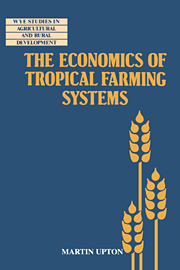11 - Surveys
Published online by Cambridge University Press: 05 June 2012
Summary
Purposes and methods
Farming Systems Research involves two kinds of farm household investigation: the descriptive and diagnostic study and on-farm testing. The first is aimed at description of the farm and household system, estimation of underlying relationships, specification of household objectives and diagnosis of key constraints and weaknesses. The second involves comparison of a group of farms which has adopted the innovation with a control group which has not, in terms of the impact on household well-being. In either case, many items of information are needed; it is a multi-subject inquiry.
Other studies needed for planning purposes may appear to have a simpler purpose such as estimating the average cost of production per tonne of maize on a particular type of farm. Even in cases such as this the simplicity may be more apparent than real. Not only are there many items of cost to be considered, but also, if the full opportunity cost of the resources used is to be estimated, some analysis of the whole farm household system is needed.
Thus all farm household studies are multi-subject inquiries. Furthermore, it is difficult to be precise about what we need to know or which items of information are essential. However, the following categories of data are generally needed.
Descriptive material on farming systems
This includes not only the areas and combinations of crops grown, together with the seasonal cropping pattern and sequences, but also numbers of each class of livestock and the methods of production used.
- Type
- Chapter
- Information
- The Economics of Tropical Farming Systems , pp. 228 - 254Publisher: Cambridge University PressPrint publication year: 1996



